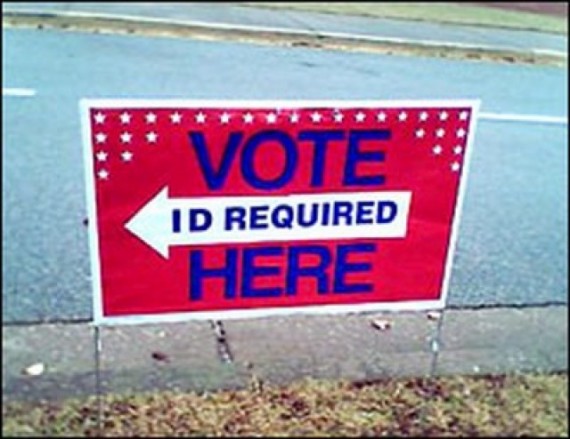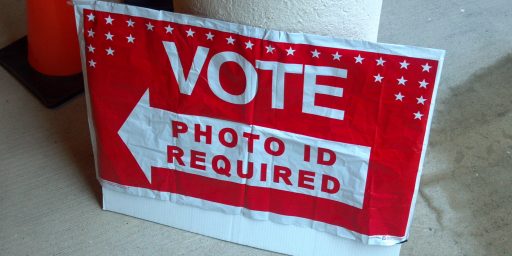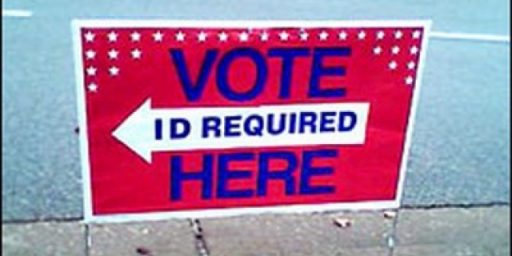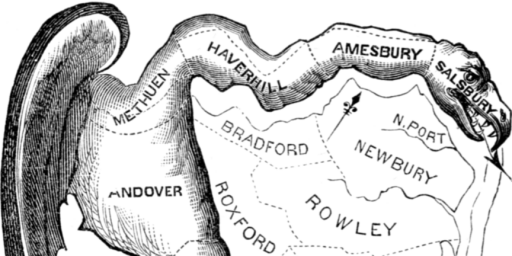Supreme Court Blocks Wisconsin Voter ID Law, But Will Likely Uphold It In The End
Opponents of Voter ID laws should not get too excited over the fact that the Supreme Court has stayed Wisconsin's law from going into effect for now.
Late on Thursday, the Supreme Court reversed a decision of the 7th Circuit Court of Appeals from September and issued a stay barring Wisconsin’s Voter ID law from going into effect until the matter is fully resolved on appeal, meaning that the law will not be enforced during the 2014 midterm elections:
The Supreme Court Thursday night blocked Wisconsin from implementing a controversial voter ID law in next month’s election.
The justices vacated a decision by a panel of the appeals court in Chicago that ruled the law could go ahead. Three justices — Antonin Scalia, Clarence Thomas and Samuel A. Alito Jr. — dissented.
(…)
The Wisconsin voter ID law has been the subject of controversy and court challenges since it was first passed in 2011. Federal and state courts had enjoined its use until this year.
But challengers said that nearly 10 percent of Wisconsin voters did not have the photo ID the law required. The appeals court panel said it was still possible for those voters to get the necessary identification in time for the election.The Supreme Court majority gave no reason for its decision. But one cause of concern was that some mail-in ballots had already been cast, and for them to count, the voter would have to show up later to produce the proper identification.
Alito mentioned that in dissenting.
“There is a colorable basis for the court’s decision due to the proximity of the upcoming general election,” he wrote. “It is particularly troubling that absentee ballots have been sent out without any notation that proof of photo identification must be submitted.”
But he and the other dissenters said the Supreme Court’s precedents dictated that stays of appeal court decisions not be granted unless the lower court “clearly and demonstrably erred in its application of accepted standards.” The panel of the U.S. Court of Appeals for the 7th Circuit had not done so, he said.
Attorney General Eric H. Holder Jr., whose department intervened on behalf of challengers of the laws, praised both of the courts’ rulings.
This move comes just a few days after the 7th Circuit, in a separate ruling, upheld the Wisconsin law as Constitutional, reversing the ruling of a Federal District Court Judge early this year that had struck the law down based in large part on its allegedly disproportionate impact on minorities and the poor. The Supreme Court’s action, however, is not directed at that ruling, but is instead directed at the more immediately contentious issue of whether or not the law would be allowed to go into effect for the upcoming election even though it remains on appeal and there is some indication that jurisdictions in the state may not be ready for it. After the 7th Circuit panel agreed to lift the stay in September, there was no small degree of contentious pleading by both sides trying to persuade the 7th Circuit as a whole to review the matter en banc, but that effort failed to succeed so the opponents of the law took the matter to the Supreme Court. Obviously, that effort has succeeded.
Rick Hasen comments on the outcome:
That same Purcell principle applies even more strongly to Wisconsin. That is, even if the Supreme Court ultimately would say that Wisconsin’s law is constitutional and does not violate the Voting Rights Act, this is a very strong case under Purcell. (As I explained, the key question is whether Wisconsin has a strong enough state interest in its sovereignty over elections to implement a voter id law very quickly before the election, when there has been no preparation and when the undisputed evidence shows that, by the state’s own account, up to 10 percent of the state’s voters could be disenfranchised (a position the 7th Circuit en banc dissenters called shocking).
The Purcell principle that Hasan refers to comes from a 2006 case called Purcell v. Gonzalez in which the Supreme Court reversed the Ninth Circuit and granted a stay in the enforcement of an Arizona law dealing with Voter ID and other related issue. As in this case, the ruling was released just days before Election Day and the Supreme Court strongly rebuked the Ninth Circuit, and the District Court Judge, and Justice Stevens argued in a brief concurrence that courts should be careful in allowing major changes to election laws to go into effect while appeals were still pending. In this case, opponents of the law contended that allowing the law to go into effect would be chaotic due to the fact that many counties in the state were reporting that they weren’t ready to enforce the law at the polls on Election Day and the fact that more than ten thousand absentee ballots had already been mailed out before the 7th Circuit lifted the say in September. If the law was fully enforced, those absentee ballots likely would have been considered uncountable because the procedures set forth under the Voter ID law were not followed. While the Court doesn’t directly address Purcell in the order that was issued in this case, and indeed doesn’t really go into much detail for the reasoning behind its positioning, the language of the dissent entered by Justice Alito suggests strongly that this was the guiding principle behind what the Court did. At least temporarily, the Court is sending the message in this case that the law should still be subject to the stay until the appeals are resolved, and especially during an election when enforcing it could prove to be both chaotic and disenfranchise voters for reasons that actually have nothing to do with their ability to comply with the identification requirements.
All of this being said, it would be a mistake to assume that the Supreme Court’s actions this week are any indication of how the Supreme Court will ultimately rule on this issue if it comes before them. As I’ve noted before, it wasn’t that long ago that the Court upheld a similar Voter ID law out of Indiana by a 6-3 vote. While the membership of the Court has changed somewhat since that case was decided, it has not changed enough to conclude that there will not be at least a 5-4 majority in favor of the law when it comes time to make a decision. Of the six votes in that case, only one, John Paul Stevens, has left the Court, and it’s unlikely that any of the other five Justices will be persuaded to change their mind on the issue. As Rick Hasen said in a post early this morning, one should not read too much into this stay from the Supreme Court. At most, they are simply seeking to maintain the status quo while the case is still on appeal and to avoid needless chaos on Election Day. When it comes down to a final vote, the Justices are likely to uphold the law and allow it to go forward for future elections.





This just adds to the litany of contemptible behavior on the part of Republicans. I still have a hard time understanding just how one achieves the level of cynicism and anti-Americanism required to actually use the law to suppress votes. You cannot say you believe in democracy and support these efforts. This is a fascistic impulse, a racist impulse, a power-at-all-costs action that makes a mockery of Republican pretensions to patriotism and belief in the American system of government.
@michael reynolds:
“I still have a hard time understanding just how one achieves the level of cynicism and anti-Americanism required to actually use the law to suppress votes.”
Just because it works. As I pointed out the other day, a GAO study indicates it reduces the number of votes by 2-3% compared to similar states with no voter ID law.
Serious question Doug: if a Republican legislature somewhere passes a law that allows only property owners to what, without any talk about race in the text of the law, would you consider it within the rights of the legislature? When is the point where “matters of policy” become constitutional violations?
@humanoid.panda:
That type of provision would be a clear violation of several Constitutional Amendments. As the Supreme Court found in the Indiana case eight years ago, the same is simply not true of Voter ID laws.
Why? As Jack pointed out the other day,there is no federal right to vote according to Bush vs. Gore. so equal protection does not apply.. The Supreme Court is about to throw out disparate impact as consideration, and probably will further gut the VRA. In the 19th century, property restrictions existed, so originalists will be happy. States might have a rational interest in limiting franchise- making the electorate more connected to the state. What is is exactly the theoretical principle that says that property restrictions are unacceptable?
It seems your logic is that Voter ID laws are constitutional, because the Supreme Court says so, and property restrictions not, because they seem to be flying in the face of the logic of all legislation since 1964. However, since the Roberts Five clearly see the Civil Rights legislation as at best an emergency measure whose time had passed, what is it exactly that franchise restrictions unconstitutional, as long as they don’t explicitly bar women and minorities from voting?
@Doug Mataconis:
I’m sorry, Doug, the proper term is ” voter suppression” laws, not “voter ID” laws. Nobody but an idiot can believe any longer that the purpose of these laws is merely to ” identify voters”, and you’re not an idiot. So just own what these laws are really about.
And no, I’ certainly wouldn’t be surprised that the Roberts court would uphold voter suppression schemes. After all, the Court is committed to gutting voting rights. It’s made that clear.
This reminds me of Representative Barbara Jordan of Texas proposal of a national identity card to be carried by all citizens. She proposed this in the early 90s when working on immigration reform and trying to thwart the illegal hiring of immigrants by employers. Of course her proposal was instantly denigrated by Republicans who called it the essence of 1984 and the mark of the beast by the religious right. Now, when it suits them, required ID is wonderful.
I really don’t think it helped that there was no expansion of DMV hours of operation. Cuts to the DMV budget, along with no extra funds to implement the law. Whether or not they tried to argue the law was about a free and fair election, not allowing for the increase in time and money the implementation of the law needed showed that suppression was the outcome they intended.
Alito better be careful, since every law the Heritage Foundation and ALEC write about voter ID explicitly leave out absentee ballots. He might upset the overlords if he gives the yeomen the idea that ID be required for the actual voter fraud that exists.
My state has a voter ID law.
The DMVs aren’t super convenient but there is a way to get a voter only ID card for free at various city halls.
Also a lack of ID doesn’t mean you can’t vote but your vote is provisional upon proof of who you are (believe that if you got without ID they mail an affidavit to your home, you sign and return saying that you voted in the election without your ID).
Voter turn out was high still in 2012 when they first began phasing in the law.
I don’t necessarily believe vote fraud will be stopped with an ID but I don’t find it an especially difficult burden either.
States would do better to clean up voter roles and crosscheck for double voting in more than one jurisdiction or two states if they really wanted to prevent fraud (and there are cases of this type of fraud).
@Just Me: I generally agree with you on the real actions state officials could take to clean up the voter rolls
This Voter ID fetish is a solution search of a problem – the problem being that Republicans want fewer Democratic constituents to vote.
I have yet to hear Republicans express a desire to reform absentee voting, where there is potentially a bigger problem than the virtually nonexistent problem of in-person voter fraud.
Again, I have not been asked for ID at my polling place in the 23 years that I’ve lived here. I suppose I could turn myself in for possible voter fraud, I mean, I am a Democrat.
Why do people keep misspelling the word suppression?
I’m curious how it is “suppression” to seek to limit it to one lawfully enfranchised individual, one vote by verifying the lawfully enfranchised individual’s identity using a government issued identification?
I know, that isn’t the historical Democrat way, but really get with the times.
@JKB: How many people have voted multiple times in one election? Where is there a demonstrated empirically proven problem in the area of in-person voter fraud? Now I know that historically empirical evidence hasn’t mattered much to Republicans, but really, time to get with it.
When the Republicans start making it easier to get a valid id, then I will be willing to believe that this voter id push is anything other than vote suppression.
The courts are making a mistake by viewing these laws through the narrow lens of the ID requirement only, which is disingenuous because all of these laws were passed as part of a larger package of laws making changes to electoral procedure in their respective states. When those packages are viewed in their entirety, it becomes pretty clear that the intent was, and remains, to discourage opposition turnout.
To wit, NC SB667, which sought to impose financial penalties on the parents of NC resident college students who registered to vote in the counties where they attend college.
Now, anybody with a brain knows what the intent of that bill was – if a college student has to travel back to their home county, or request an absentee ballot from the same, in order to vote, it’s far less likely that many of them will vote at all.
Nevermind that these ID laws do nothing, absolutely nothing, to address what has consistently shown up as the source of what little legitimate election fraud occurs – absentee ballots. Why, you ask? Because absentee ballots are heavily comprised of military votes, and the GOP sees that as a constituency which favors it, so they leave it alone.
The hypocrisy and downright duplicity involved with these laws is honesty disgusting.
But it isn’t remotely surprising …
@Dave D: “I really don’t think it helped that there was no expansion of DMV hours of operation. ”
IIRC, Walker cut DMV hours to one day a month. Guess which ones?